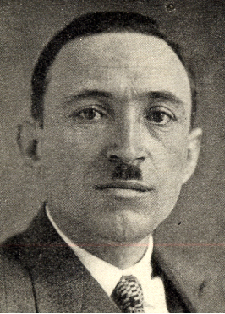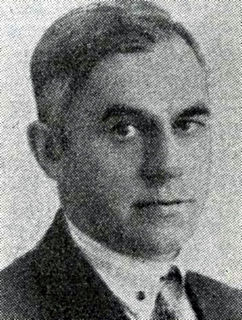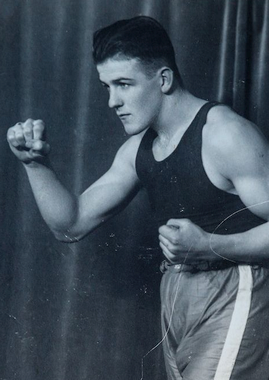 W
WTodor Angelov Dzekov was a Bulgarian anarcho-communist revolutionary who lived and was active for a long time in Western Europe. During World War II, he headed a Brussels-based group of the Belgian Resistance against Nazi Germany; he was captured and sentenced to death by the Nazis.
 W
WOlga Benário Prestes was a German communist militant gassed by Nazi Germany.
 W
WRobert Marcel Charles Benoist was a French Grand Prix motor racing driver and war hero.
 W
WAbraham Joseph Berline was a Russian artist who lived in Paris and died during World War II.
 W
WDietrich Bonhoeffer was a Lutheran pastor, theologian, anti-Nazi dissident, and key founding member of the Confessing Church. His writings on Christianity's role in the secular world have become widely influential, and his book The Cost of Discipleship has been described as a modern classic.
 W
WElisabeth ten Boom was a Dutch woman, the daughter of a watchmaker, who suffered persecution under the Nazi regime in World War II, including incarceration in Ravensbrück concentration camp, where she died aged 59. The daughter of Casper ten Boom, she is one of the leading characters in The Hiding Place, a book written by her sister Corrie ten Boom about the family′s experiences during World War II. Nicknamed Betsie, she suffered from pernicious anemia from her birth. The oldest of five Ten Boom children, she did not leave the family and marry, but remained at home until World War II. She is a Righteous Among the Nations.
 W
WMarie Rachel Eudoxie Bouffa was a member of the Belgian resistance during World War II and recognized as Righteous Among the Nations.
 W
WWilhelm Franz Canaris was a German admiral and chief of the Abwehr, the German military intelligence service, from 1935 to 1944. Initially a supporter of Adolf Hitler, by 1939 he had turned against the regime. During World War II, he was among the military officers involved in the clandestine opposition to Nazi Germany leadership. He was executed in Flossenbürg concentration camp for high treason as the Nazi regime was collapsing.
 W
WBronisław "Bronek" Czech was a Polish sportsman and artist. A gifted skier, he won championships of Poland 24 times in various skiing disciplines, including Alpine skiing, Nordic skiing and ski jumping. A member of the Polish national team at three consecutive Winter Olympics, he was also one of the pioneers of mountain rescue in the Tatra Mountains and a glider instructor. He perished in the Auschwitz concentration camp.
 W
WCharles Delestraint was a French Army lieutenant general and member of the French Resistance during World War II. He also befriended Charles de Gaulle. Delestraint was killed by the Gestapo in 1945.
 W
WRobert Desnos was a French surrealist poet who played a key role in the Surrealist movement of his day.
 W
WHans von Dohnanyi was a German jurist of Hungarian ancestry, Righteous Among the Nations, and German resistance member against the Nazi régime.
 W
WJohann Georg Elser was a German worker who planned and carried out an elaborate assassination attempt on Adolf Hitler and other high-ranking Nazi leaders on 8 November 1939 at the Bürgerbräukeller in Munich. Elser constructed and placed a bomb near the platform from which Hitler was to deliver a speech. It did not kill Hitler, who left earlier than expected, but it did kill 8 people and injured 62 others. Elser was held as a prisoner for more than five years until he was executed at the Dachau concentration camp less than a month before the surrender of Nazi Germany.
 W
WBenjamin Fondane or Benjamin Fundoianu was a Romanian and French poet, critic and existentialist philosopher, also noted for his work in film and theater. Known from his Romanian youth as a Symbolist poet and columnist, he alternated Neoromantic and Expressionist themes with echoes from Tudor Arghezi, and dedicated several poetic cycles to the rural life of his native Moldavia. Fondane, who was of Jewish Romanian extraction and a nephew of Jewish intellectuals Elias and Moses Schwartzfeld, participated in both minority secular Jewish culture and mainstream Romanian culture. During and after World War I, he was active as a cultural critic, avant-garde promoter and, with his brother-in-law Armand Pascal, manager of the theatrical troupe Insula.
 W
WAugust Froehlich was a German-Silesian Roman Catholic priest. In his pastoral activity he opposed National Socialism. He campaigned in the name of German Catholics and of Polish forced labourers. He died in Dachau concentration camp.
 W
WLudwig Gehre was an officer and resistance fighter involved in the preparation of an assassination attempt against Adolf Hitler.
 W
WMajor Edward Karol Gött-Getyński, or Get-Getyński nom-de-guerre Sosnowiecki was a Major of Artillery in the Polish Army during the interwar period, and the underground resistance fighter during the Nazi German occupation of Poland. He was shot dead at the Auschwitz concentration camp following the discovery of his clandestine work.
 W
WNikolaus Gross was a German Roman Catholic. Gross first worked in crafts requiring skilled labor before becoming a coal miner like his father while joining a range of trade union and political movements. But he soon settled on becoming a journalist before he got married while World War II prompted him to become a resistance fighter in the time of the Third Reich and for his anti-violent rhetoric and approach to opposing Adolf Hitler. He was also one of those implicated and arrested for the assassination attempt on Hitler despite not being involved himself.
 W
WPaul Hoornaert was a Belgian far right political activist. Although a pioneer of fascism in the country he was an opponent of German Nazism and, after joining the Belgian Resistance during the German occupation, died in Nazi custody.
 W
WGeorges Henri Journois was a French resistance fighter and Brigadier General who died in a subcamp of the Neuengamme concentration camp in Wilhelmshaven, Germany.
 W
WJan Karcz was a Polish Army Colonel, posthumously promoted to the rank of a Brigadier General.
 W
WErnst Knaack was a German Communist and resistance fighter against the Nazi Germany régime.
 W
WCornelis Gerhard Anton de Kom was a Surinamese resistance fighter and anti-colonialist author. In Suriname he was arrested, and the protest against his arrest resulted in two deaths. De Kom was subsequently exiled to the Netherlands where he wrote Wij slaven van Suriname, a classic anti-colonial book. During World War II, he joined the resistance, was arrested, and sent to concentration camps where he died.
 W
WHalina Krahelska was a Polish activist, publicist and writer.
 W
WJulien Lehouck was a Belgian sprinter. He competed in the men's 100 metres at the 1920 Summer Olympics. He was part of the Belgian Resistance and was executed in Fort Breendonk during World War II.
 W
WMarianne Katharina "Käthe" Leichter was an Austrian economist, women's rights activist, journalist and politician. She was a member of the Social Democratic Party of Austria and the Viennese Labour Chamber. She was detained in Ravensbrück concentration camp during the Nazi regime and killed by gas at the Bernburg Euthanasia Centre in 1942.
 W
WJosef Lenzel was a German Roman Catholic priest active in resistance movement against the National Socialism, who died in the Dachau concentration camp where he had been sent as a result of his work with Polish forced labourers.
 W
WAugustin Malroux was a French socialist politician and member of the French Resistance, a teacher by profession.
 W
WSimone Michel-Lévy was a French Resistance worker. She had several pseudonyms – Emma, Françoise, Madame Royale, Mademoiselle Flaubert or Madame Bertrand - and is one of 6 female compagnons de la Libération.
 W
WJan Mosdorf, was a Polish right-wing politician, director of the nationalist organization All-Polish Youth and member of the far-right political party National Radical Camp (ONR). He also worked as a publicist, using the pseudonym Andrzej Witkowski. In 1943, Mosdorf was killed in the Auschwitz concentration camp.
 W
WKarl Wolfgang Franz Count Motesiczky was an Austrian psychoanalyst and an active opponent of National Socialism. Posthumously, he was honoured as a Righteous Among the Nations.
 W
WKurt Nehrling was a German Social Democratic politician and member of the German resistance against Hitler. Nehrling was responsible for supplying information to the Soviet Union and hid banned books. He was later caught by the SS and killed at the Dachau concentration camp.
 W
WJózef Noji was a Polish long-distance runner.
 W
WAlfred Gottfried Ochshorn was a Jewish Austrian communist student activist and fighter during the Spanish Civil War. At the end of the Spanish Republic he went to France where he worked as a translator for German troops while also active in forging papers to aid the French Resistance. After being betrayed by an informant, he was arrested in 1943 by the Gestapo and sent to the Mauthausen concentration camp. He died after being shot by a guard, Martin Bartesch, during an escape attempt.
 W
WHans Paul Oster was a general in the Wehrmacht of Nazi Germany and a leading figure of the German resistance from 1938 to 1943. As deputy head of the counter-espionage bureau in the Abwehr, Oster was in a good position to conduct resistance operations under the guise of intelligence work; he was dismissed for helping Jews avoid arrest.
 W
WFriedrich von Rabenau was a German career-soldier, general, theologian, and opponent of National Socialism.
 W
WKarl Sack was a German jurist and member of the resistance movement during World War II.
 W
WFelice Rahel Schragenheim was a Jewish resistance fighter during World War II. She is known for her tragic love story with Lilly Wust and death during a march from Gross-Rosen concentration camp to Bergen-Belsen concentration camp in Germany or, not later than, March 1945 in Bergen-Belsen.
 W
WStanisław Sedlaczek, born in Kołomyja, in what is now Ukraine, was a Polish professor and scoutmaster. One of the organizers of pre-war Sokół troops among university students, he founded the underground resistance scouting organisation "Hufce Polskie" during World War II.
 W
WAleksander Stawarz codename: Leśnik, Baca was a Polish Army Colonel.
 W
WJohannes Stubberud was a Norwegian newspaper editor who was imprisoned and killed during the occupation of Norway by Nazi Germany.
 W
WAugustyn Suski, was a Polish poet, pedagogue in the interwar period, and underground activist during World War II. Under the German occupation, Suski became a founder of the Polish resistance organization called Tatra Confederation, a.k.a. Confederation of the Tatra Mountains, operating in the Nowy Targ area of Podhale. He died at the Auschwitz concentration camp.
 W
WErnest Toussaint was a Luxembourgian boxer who competed in the 1936 Summer Olympics. He was born in Rumelange.
 W
WFriedrich Weißler was a German lawyer and judge. He came from a Jewish family but was baptized as Protestant as a child. He belonged to the Christian resistance against National Socialism.
 W
WAlbert Willimsky was a German Roman Catholic priest active in resistance movement against the National Socialism, martyred in the Sachsenhausen concentration camp.